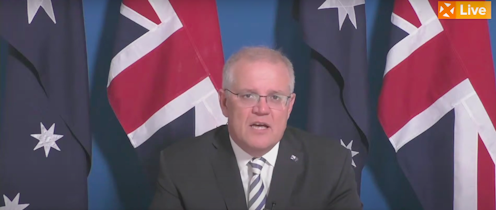Scott Morrison's message to China: Don't pigeonhole us
- Written by Michelle Grattan, Professorial Fellow, University of Canberra

Australia’s actions should not be seen just through the lens of the strategic competition between China and the United States, Scott Morrison has said in a speech rejecting “binary choices”.
With China casting Australia as an extension of America, disrupting trade, and citing multiple grievances, Morrison reaffirmed the importance Australia put on wanting a positive bilateral relationship.
“Australia desires an open, transparent and mutually beneficial relationship with China as our largest trading partner, where there are strong people-to-people ties, complementary economies and a shared interest in regional development and wellbeing, especially in the emerging economies of Southeast Asia,” he said.
Equally, Australia was “absolutely committed” to its alliance with the United States, based on a shared world view, liberal democratic values and market-based economics.
“And at all times we must be true to our values and the protection of our own sovereignty.”
He acknowledged the global competition between China and the US “presents new challenges, especially for nation states in the Indo-Pacific”. Like other countries in the region “our preference is not to be forced into binary choices”.
Addressing the British Policy Exchange on Monday night, Morrison warned that “our present challenge in the Indo-Pacific is the foretaste for so many others around the world, including the United Kingdom and Europe.”
Australia’s pursuit of its interests in the midst of the China-US strategic competition was made more complex by the assumptions made about its actions, he said.
“Our actions are wrongly seen and interpreted by some only through the lens of the strategic competition between China and the United States.
"It’s as if Australia does not have its own unique interests or views as an independent sovereign state. This is false and needlessly deteriorates relationships.
"If we are to avoid a new era of polarisation, then in the decades ahead, there must be a more nuanced appreciation of individual states’ interests in how they deal with the major powers. Stark choices are in no-one’s interests.
"Greater latitude will be required from the world’s largest powers to accommodate the individual interests of their partners and allies. We all need a bit more room to move,” Morrison said.
He said international institutions also had an important role as circuit breakers. “To provide the space and frameworks for meaningful and positive interaction to be maintained, as a bulwark against any emerging divide.”
Morrison talked up the role the OECD had to play “in support of open trade and market-based principles”. The Australian government is currently running a strong campaign to try to have former finance minister Mathias Cormann elected secretary-general of the OECD.
Morrison also noted the importance of the World Trade Organisation in promoting shared interests, as well as the G7-plus, and the Five-Eyes arrangement, where co-operation had extended beyond traditional security to the economic realm.
He lamented that “two of the most important economies in the region – the United States and India” had decided not to joint the Trans-Pacific Partnership and the recently-concluded Regional Comprehensive Economic Partnership respectively.
“Of course, we respect those decisions. But they both remain welcome to join. Our response is straightforward.
"Working with our partners, we plan to make the TPP such a powerful force for open trade and investment that the US and, in the future, India and others will join without reservation. And that includes the UK.
"Interestingly, [China’s] President Xi Jinping has also now expressed interest in possible participation in the TPP,” Morrison said.
“The critical thing about the TPP is that it developed WTO-plus disciplines in key areas of intellectual property, digital commerce and state-owned enterprises.
"These are some of the areas where the WTO has fallen short.”
Authors: Michelle Grattan, Professorial Fellow, University of Canberra
Read more https://theconversation.com/scott-morrisons-message-to-china-dont-pigeonhole-us-150663





